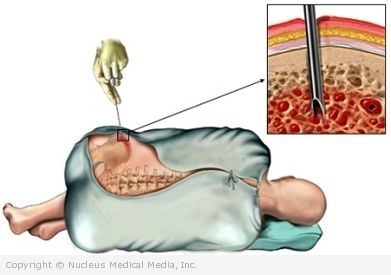Biopsy – Definition
A biopsy is the removal of a sample of tissue or cells. A doctor will examine the sample under a microscope.
A biopsy may be taken from any part of the body.
Biopsy – Reasons for Procedure
A biopsy is used to see if the cells from a sample of tissue are abnormal. A biopsy is done to rule out cancer and/or to specify its type and level of aggressiveness.
Biopsies are sometimes taken to find out the cause of an unexplained:
- Infection
- Swelling
- Growth
Common interpretations of biopsies include:
- Normal tissue, no abnormalities
- Irritated tissue
- Not normal, but difficult to interpret
- Not normal, not cancerous, but a precancerous condition
- Cancer
- Inconclusive
Biopsy – Possible Complications
Complications are rare, but no procedure is completely free of risk. If you are planning to have a biopsy, your doctor will review a list of possible complications, which may include:
- Bleeding
- Pain
- Infection
- Scarring
- Results that are difficult to interpret
Smoking may increase the risk of complications.
Be sure to discuss these risks with your doctor before the surgery.
Biopsy – What to Expect
Prior to Procedure
Talk to your doctor about your medicines. You may be asked to stop taking some medicines up to one week before the procedure such as:
- Anti-inflammatory drugs (eg, aspirin)
- Blood thinners, like clopidogrel (Plavix) or warfarin (Coumadin)
Avoid eating or drinking after midnight if you are going to have general anesthesia. .
Biopsy – Anesthesia
The type of anesthesia used depends on what you are having biopsied:
- General anesthesia — blocks pain and keeps you asleep through the procedure; given through an IV
- Local anesthesia — just the area that is being operated on is numbed; given as an injection
Biopsy – Description of the Procedure
For a simple biopsy, the area will be cleaned. A numbing medicine will be injected into the area so that you will not feel pain. A piece of tissue or skin will then be removed. The opening will be closed.
The procedure that your doctor uses will depend on the type of biopsy that you are having. For example:
- Needle biopsy — cells are removed using a thin needle
- Aspiration biopsy — cells are drawn out with a hollow needle that uses suction
- Core needle biopsy — a sample of tissue is removed using a hollow core needle that has a special cutting edge
- Vacuum-assisted biopsy — a number of samples of tissue are taken using a special rotating probe
- Endoscopic biopsy — the area is viewed with a long, thin tube that has a lighted camera on one end (called an endoscope); a tool is passed through the tube to take the biopsy sample
- Incisional biopsy — a portion of a mass is removed by cutting it out
- Excisional biopsy — a mass is completely removed (eg, breast lump)
- Punch biopsy — a core of skin is removed with a special biopsy tool
- Skin biopsy — a small piece of skin is cut off with a scalpel
- Shave biopsy — top layers of skin are shaved off with a special blade
- Bone marrow biopsy — a long needle is inserted into the bone marrow to collect cells
Biopsy – How Long Will It Take?
A simple biopsy usually takes a few minutes. A biopsy involving surgery takes longer.
Biopsy – How Much Will It Hurt?
You will have pain in the area where the sample was removed. Your doctor may give you pain medicine.
Biopsy – Average Hospital Stay
You will be able to go home after a simple biopsy. If your biopsy involved surgery, you may need to stay in the hospital for 1-2 days.
Biopsy – Post-procedure Care
Be sure to follow your doctor’s instructions.
- Take pain medicine as directed by your doctor.
- To relieve discomfort, apply a warm compress or a heating pad to the area.
- Ask your doctor when you should change the bandages.
- Ask your doctor when it is safe to shower, bathe, or soak in water.
- If you have stitches, have them removed in about a week.
Biopsy – Call Your Doctor
After you leave the hospital, contact your doctor if any of the following occurs:
- Redness, swelling, increasing pain, excessive bleeding, or discharge from the biopsy site
- Signs of infection, including fever and chills
- Bleeding
- Pain that you cannot control with the medicines you have been given
- Any new symptoms
In case of an emergency, call for medical help right away.

